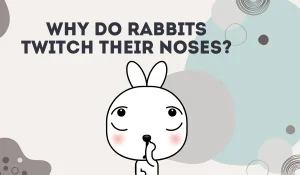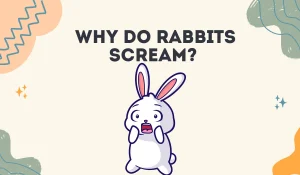Rabbits are adorable creatures that are known for their love of carrots and lettuce. However, you may be wondering if rabbits eat bugs. The answer is not straightforward, as rabbits are herbivores and typically consume only plants. However, they may occasionally eat insects if they come across them in their natural habitat.
According to Petsial, rabbits are known to opportunistically eat insects from time to time. If your rabbit has munched down a grasshopper or ladybug, there’s no need to worry. However, insects should not be a regular part of a rabbit’s diet. Rabbits are herbivores, and their digestive systems are designed to process plant-based foods.
While rabbits may occasionally eat insects, they are not considered a significant source of nutrition for these animals. Most insects are so small that rabbits will not even notice their presence. Larger bugs can be dangerous, as can those with self-defense properties. In general, rabbits are not predatory animals and do not actively seek out insects to eat.
Do Rabbits Eat Bugs?
Rabbits are known to be herbivores, meaning that they mainly consume plants as their source of food. However, there are instances where rabbits may eat insects. In this section, we will explore what rabbits eat, whether bugs are a part of a rabbit’s diet, and why rabbits may eat bugs.
What Do Rabbits Eat?
Rabbits are known to consume a variety of plants, including grass, hay, and vegetables. These types of food provide rabbits with the necessary nutrients, including fiber, protein, and vitamins. Rabbits also have a unique digestive system that allows them to extract nutrients from their food efficiently.
It is important to note that rabbits should not consume foods that are high in sugar, such as fruits and sweets, as it can lead to health problems.
Are Bugs a Part of a Rabbit’s Diet?
While rabbits are known to eat plants, they may also consume insects from time to time. However, bugs are not a significant part of a rabbit’s diet, and rabbits should not rely on them as a source of nutrition.
According to Pet Care Advisors, rabbits do not eat any bugs, including crickets, grasshoppers, flies, ticks, and spiders. These animals are herbivores, meaning that they will get their energy by eating only plants and plants alone.
Why Do Rabbits Eat Bugs?
Rabbits may eat insects for a variety of reasons. In some cases, rabbits may eat insects out of curiosity or boredom. In other cases, rabbits may eat insects if they are not getting enough nutrients from their regular diet.
However, it is important to note that not all insects are safe for rabbits to consume. Larger bugs can be dangerous, as can those with self-defense properties. If a bug is deemed a threat, the rabbit may defend itself, which may involve biting and possibly even eating the bug.
In conclusion, while rabbits are known to be herbivores, they may occasionally eat bugs. However, bugs are not a significant part of a rabbit’s diet, and rabbits should not rely on them as a source of nutrition.
Bugs That Rabbits Eat
Rabbits are herbivores and primarily eat plants, but they may also eat insects opportunistically. Here are some common bugs that rabbits may eat:
Grasshoppers
Grasshoppers are a common insect that rabbits may eat. They are high in protein and other nutrients, making them a good snack for rabbits.
Crickets
Crickets are another insect that rabbits may eat. They are also high in protein and other nutrients, making them a good snack for rabbits.
Beetles
Beetles are a group of insects that rabbits may eat. Some beetles, such as ladybugs, are considered safe for rabbits to eat. However, other beetles may be toxic and should be avoided.
Worms
Worms are another type of insect that rabbits may eat. They are high in protein and other nutrients, making them a good snack for rabbits.
Caterpillars
Caterpillars are the larval stage of moths and butterflies. Some caterpillars, such as the woolly bear caterpillar, are considered safe for rabbits to eat. However, other caterpillars may be toxic and should be avoided.
Potential Risks of Feeding Bugs to Rabbits
Pesticides and Other Contaminants
Feeding bugs to rabbits may expose them to pesticides and other harmful contaminants. Bugs that are caught outside may have come into contact with pesticides used in gardens, on lawns, or in other outdoor areas. Additionally, bugs that are purchased from pet stores or other sources may have been treated with pesticides or other chemicals. These contaminants can be harmful to rabbits and may cause health problems such as organ damage, neurological issues, and even death.
Choking Hazard
Feeding bugs to rabbits can also pose a choking hazard. Bugs that are too large or too hard to chew may become lodged in the rabbit’s throat, causing them to choke. This can be a serious issue and may require immediate veterinary attention. Additionally, rabbits that are fed bugs that are still alive may accidentally inhale the bug, causing respiratory issues.
Digestive Problems
Rabbits are herbivores and have a delicate digestive system. Feeding them bugs may disrupt their digestive process and cause issues such as diarrhea, constipation, and bloating. Bugs that are high in fat or protein may be particularly problematic for rabbits, as they are not equipped to digest these nutrients in large quantities. Additionally, some bugs may contain toxins or other substances that can be harmful to rabbits if ingested in large amounts.
How to Incorporate Bugs into Your Rabbit’s Diet
Rabbits are herbivores and primarily eat plant-based food. However, some bugs can be a nutritious addition to their diet if fed in moderation. Here are some tips on how to safely incorporate bugs into your rabbit’s diet:
Selecting Safe and Nutritious Bugs
Not all bugs are safe for rabbits to eat. Some bugs can be toxic or cause digestive problems. It’s important to select safe and nutritious bugs for your rabbit. Some safe and nutritious bugs that rabbits can eat include:
| Bug | Nutritional Value |
| Mealworms | High in protein and low in fat |
| Crickets | High in protein and low in fat |
| Grasshoppers | High in protein and low in fat |
| Beetles | High in protein and low in fat |
When selecting bugs, it’s important to avoid poisonous bugs and bugs that have been exposed to pesticides or other chemicals. It’s also important to feed your rabbit bugs in moderation.
Feeding Bugs in Moderation
Bugs should only be fed to rabbits as a treat and in moderation. Feeding too many bugs can cause digestive problems and lead to obesity. The amount of bugs to feed your rabbit depends on their size and weight. As a general rule, you should not feed your rabbit more than one or two bugs per day.
It’s also important to introduce bugs to your rabbit’s diet slowly. Start with a small amount and gradually increase the amount over time. This will help prevent digestive problems.
Supplementing with Other Foods
Bugs should not be the primary source of nutrition for your rabbit. They should be fed in addition to a balanced diet of hay, fresh vegetables, and pellets. These foods provide the necessary fiber, vitamins, and minerals that rabbits need to stay healthy.
It’s important to consult with a veterinarian before introducing bugs or any other new food to your rabbit’s diet. They can help you determine the appropriate amount and frequency of bugs to feed your rabbit based on their individual needs.
Can rabbits eat ladybugs?
While rabbits are herbivores and typically feed on vegetation such as hay, grass, and leafy greens, they may occasionally eat insects or other small creatures. However, it is not recommended to feed rabbits ladybugs as their exoskeletons contain toxins that can be harmful to the rabbit’s digestive system.
Ladybugs secrete a substance called hemolymph, which is bitter and contains alkaloids that can be toxic to some animals, including rabbits. Ingesting ladybugs can cause gastrointestinal upset, vomiting, and diarrhea in rabbits, and in severe cases, it can even be fatal.
Do rabbits eat living things?
While rabbits are herbivores and mainly eat plant-based foods such as hay, grass, and leafy greens, they may occasionally eat other living things such as insects, snails, or slugs. However, this is not a regular part of their diet, and they do not rely on animal-based proteins for their nutritional needs.
Rabbits may eat insects or other small creatures if they come across them while foraging for food, but they do not actively hunt or prey on other living things. Their digestive system is adapted to breaking down and utilizing plant-based foods, and a diet that is high in animal proteins or fats can be harmful to their health.
Do bunnies eat caterpillars?
Bunnies are primarily herbivorous and mainly feed on plant-based foods such as hay, grass, and leafy greens. While they may occasionally consume small insects or other living things such as caterpillars, it is not a significant part of their diet, and they do not actively hunt or prey on other animals.
Eating caterpillars or other insects may happen accidentally while foraging for plant-based foods or when a rabbit is particularly hungry, but they do not rely on animal-based proteins for their nutritional needs.



